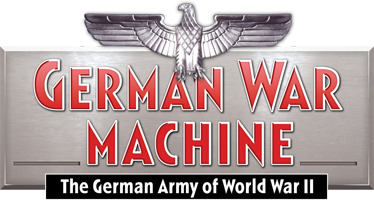18 August
Armed Forces, Navy
The German Naval High Command orders the previously planned “Three Front War Programme” to come into effect as an emergency measure.
19 August
Armed Forces, Navy
14 submarines leave Germany and sail to their war stations in the North Atlantic.
21 August
Armed Forces, Navy
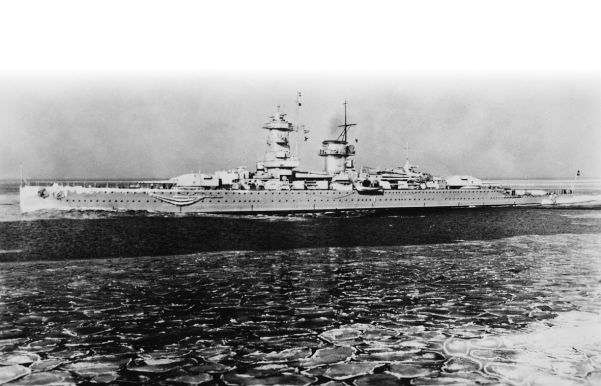
The pocket battleship Admiral Graf Spee sails from Wilhelmshaven.
23 August
Germany, Treaties
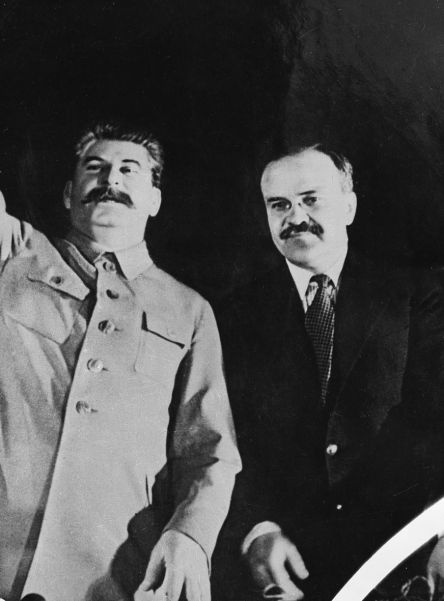
Ribbentrop and his Soviet counterpart, Molotov sign the Russo-German Non-aggression Treaty, by which neither party would attack the other and spheres of influence were agreed regarding the Baltic states and Poland.
In order to avoid a two-front war Hitler decided that the Soviet Union would have to be neutralized; to which end Hitler directed Ribbentrop to open negotiations with the Soviets. His first diplomatic overtures in Moscow were not successful. The Soviets were stalling for time as they were already negotiating with Great Britain and France. Hitler, desperate to conclude an agreement, decided to intervene personally and on August 20 sent a telegram to Stalin asking him to receive his foreign minister immediately and adding: “The conclusion of a non-aggression pact for me means the fulfilment of a long-standing German policy. Germany now resumes a political course that was beneficial to both states in past centuries. In view of the intention of both states to enter into a new relationship to each other it seems to me best not to lose any time. I therefore propose that you receive my Foreign Minister on Tuesday, August 22, or at the latest Wednesday August 23. The Reich Minister has the fullest power to draw up and sign the non-aggression pact as well as the protocol. In view of the international situation a longer stay by the minister in Moscow is impossible. A crisis may arise any day. Germany is determined to use all measures at her disposal to protect the interests of the Reich. I should be glad to receive your early answer.”
On the evening of August 21, Hitler was handed a telegram from Stalin. The Führer was overcome with uncontrollable excitement. “To the Chancellor of the German Reich, A. Hitler. I thank you for your letter. I hope that the German-Soviet non-aggression pact will bring about an important improvement in the political relations between our countries. The people of our countries need to live in peace with each other. The Soviet government have instructed me to inform you that they agree to receiving your Herr von Ribbentrop on the August 23 in Moscow.”
Hitler was apprehensive about the meeting and its outcome, feeling that his good fortune may not hold. During the negotiations Stalin made claims on the Baltic states of Estonia, Latvia and Lithuania. Ribbentrop telephoned Hitler who authorized him to accept the Soviet proposals. The protocol reached now achieved the aims of both dictators, as all of Eastern Europe had been divided up into spheres of influence between the two countries. Hitler’s attitude - that he could confidently localize any Polish conflict - was reinforced with the conclusion of the pact with the Soviet Union.
Despite British guarantees, the situation for Poland had become intolerable. Not withstanding the many assurances she received, speedy assistance from the West was most improbable. Powerful enemies, who had just become reconciled to each other and were hungry to devour her, now hounded her on both sides. Hitler for his part counted on a Western renunciation of military intervention similar to those which had taken place in 1936, 1938 and again in the spring of 1939.
24 August
Armed Forces, Navy
Two more U-boats depart to their war stations. The pocket battleship Deutschland (Hitler does want to risk a ship named after the Fatherland being sunk in any hostilities), now renamed Lützow, leaves Wilhelmshaven.
25 August
Germany, Aggression
Hitler orders the attack against Poland in the afternoon, and about two hours later the German Army in the East leaves its position of readiness for the fateful march over the Polish frontier between the Carpathian Mountains and Lithuania. Later that afternoon Hitler has a change of heart when he receives a letter from the British government that reaffirms the British intention to help Poland if Germany invades that country, and that a mutual assistance programme between England and Poland has been worked out in detail. Hitler orders Keitel: “Stop everything at once, I need time for negotiations.”
The Anglo-Polish treaty was signed on the same day at 17:40 hours and, following the advice of his commander-in-chief who was seeking to preserve the peace, Hitler decided to call off the attack. Despite the imposed radio silence, the order to halt was passed right up to the frontline, a masterly achievement in communication techniques. The army generally regarded the halt as a psychological and diplomatic weapon in the political war of nerves; similar to that used in the previous autumn before entering Czechoslovakia. But since the Poles had observed the advance and had secretly begun to mobilize, the Germans lost their planned operational surprise and with it all the advantages which might have ensued. On the other hand, they too were able to use the time for further mobilization.
Great Britain, Treaties
Anglo-Polish treaty of mutual assistance.
27 August
Germany, Merchant Marine
German merchant ships are instructed to return home to Germany or to make for the nearest neutral port. The threat of war hangs over Europe like a black cloud.
Germany, Armed Forces
In German military circles there is little enthusiasm for war, leading to rumblings of disquiet. Most of the officers are well aware of the possible military and political difficulties which its armed forces might encounter. These objections, which Hitler regards as defeatist, he overrides, believing in his own intuition.
The Polish mobilization on the March 25, 1939, caused Hitler to decide that the German-Polish question could now only be resolved by force, even at the risk of a probable outbreak of war. Hitler was confident he could localize any such conflict, grossly underestimating both his opponents and his influence on world opinion. War on two fronts was Hitler’s great fear, stemming from the bitter experience gained by Germany in World War I, one which, as yet, he was not ready to risk.
28 August
Great Britain, Diplomacy
At 22:00 hours at the Chancellery in Berlin, Sir Neville Henderson, the British ambassador, meets Hitler to deliver another letter from the British Government stating it intends to stand by Poland. Henderson’s observation was that “Hitler was once again friendly and reasonable and appeared to be not dissatisfied with the answer which I had brought him. Our conversation lasted for well over an hour.”
29 August
Great Britain, Diplomacy
At 21:15 hours, Henderson again goes to the Chancellery, this time to receive Hitler’s reply to the British Government’s letter. His reception outside the building was the same as usual: SS guard of honour at the main door, roll of drums announcing his arrival, then effusive greetings at the door by Chief of the Chancellery, Otto Meissner. However, it was another matter once inside the Chancellery. Henderson’s recollections were vivid: “I immediately sensed a more uncompromising attitude than the previous evening on Hitler’s part.” The British Government’s letter received a reply from Hitler that was starkly uncompromising, stating that the Danzig problem must be settled peacefully on German terms by the following day or he would use force. Henderson left the Chancellery noticing that the anteroom was filled with German Army officers. The die was cast.
30 August
Poland, Armed Forces
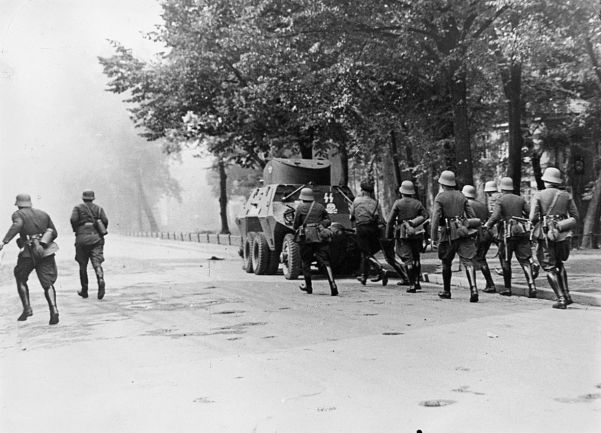
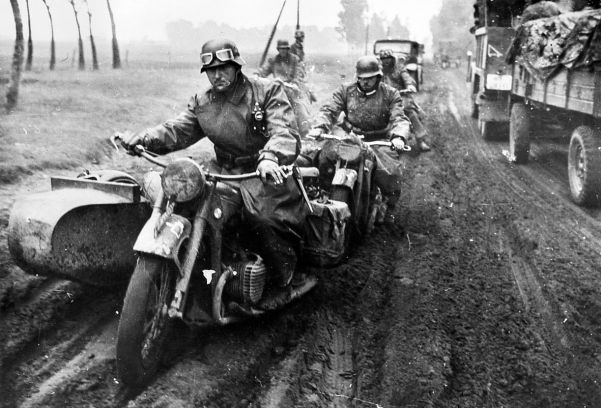
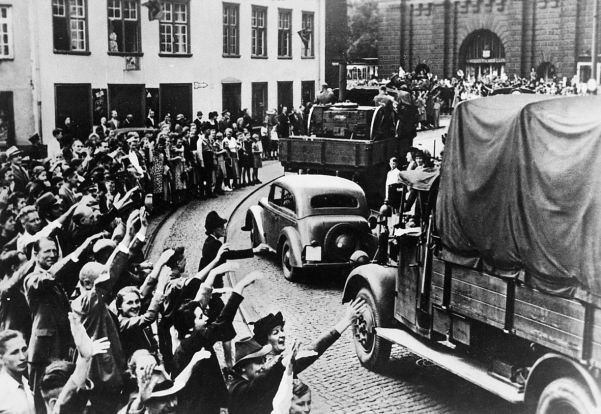
The Polish mobilization is officially announced. Hitler can wait no longer and on the next day he gives the order to invade Poland at 04:45 hours.
The time has come to undertake the deception Hitler perceived was necessary to legitimize the invasion. SS-Sturmbannführer Alfred Naujocks was chosen by SS-Obergruppenführer Heydrich to lead a simulated attack on the Gleiwitz radio stations. Formerly an engineering student at Kiel University; SS-Sturmbannführer Naujocks became an official of the Amt (Office) VI of the SS security service and was one of the most audacious commanders in the SD. He wasn’t an intelligent leader and lacked the mental capacity for creating plans such as those which SS-Obergruppenführer Heydrich conceived. However, he was an expert at carrying out an operation once it was explained. He helped Heydrich with some bombings in Slovakia, which were blamed on Slovak nationalists. At 16:00 hours on August 31, SS-Obergruppenführer Heydrich alerted SS-Sturmbannführer Naujocks in Gleiwitz and ordered him to be at the radio station at 21:45 hours that evening.
The Dachau concentration camp corpses loaded on Müller’s lorries were expected to arrive at approximately 21:25 hours. The dead “Polish soldiers” could then be scattered “convincingly” around the station. The deception party arrived on time at the station, finding a 1.8m- (6ft-) high wire fence surrounding it, but the two attached buildings which were used for living quarters were unguarded. The German operational staff of the station were not privy to Heydrich’s plan, so when Foitzik, an engineer, encountered SS-Sturmbannführer Naujocks and his companions entering the station, he mentally questioned what they were doing. As they ascended the steps leading to the broadcasting studios, he called out to them - where did they think they were going? He was silenced by the muzzle of a pistol being pointed at a spot between his eyes
On reaching the broadcasting studios, SS-Sturmbannführer Naujocks and his men began making as much noise as possible, hoping to give the impression that the station was under attack by a large Polish insurgent force. The ceiling of the studio received several shots, adding to the bedlam and petrifying the radio personnel. The staff of the station, who had by this time decided that resistance to the strangers was futile, surrendered, were handcuffed and taken to the basement of the building. Meanwhile, a flaw was discovered in the plan: Naujocks and his SS men did not know how to operate the radio equipment. The SS men were frantically turning dials and flipping switches until they finally found the storm switch. This permitted them to interrupt the programme in progress, allowing Naujocks’ Polish-speaking announcers to broadcast anti-German statements, to the background accompaniment of shots fired by other SS men for the next five minutes. Having decided they had convinced the listeners that the radio station was under attack by armed Poles, SS-Sturmbannführer Naujocks and his men withdrew.
A successful mock attack on the German customs station at Hochlinden was also made by Heydrich’s SS detachment. Additional concentration camp corpses were dressed in Polish uniforms. The fact that the dead inmates’ bodies were rigid due to the time of their death many hours earlier was of little importance to the SS leaders. The Polish military forces and police would not be able to investigate the bodies at Gleiwitz or Hochlinden. Hitler now had his justification for invading Poland. In fact, his soldiers and tanks were on the move before the SS men had returned to their bases.
